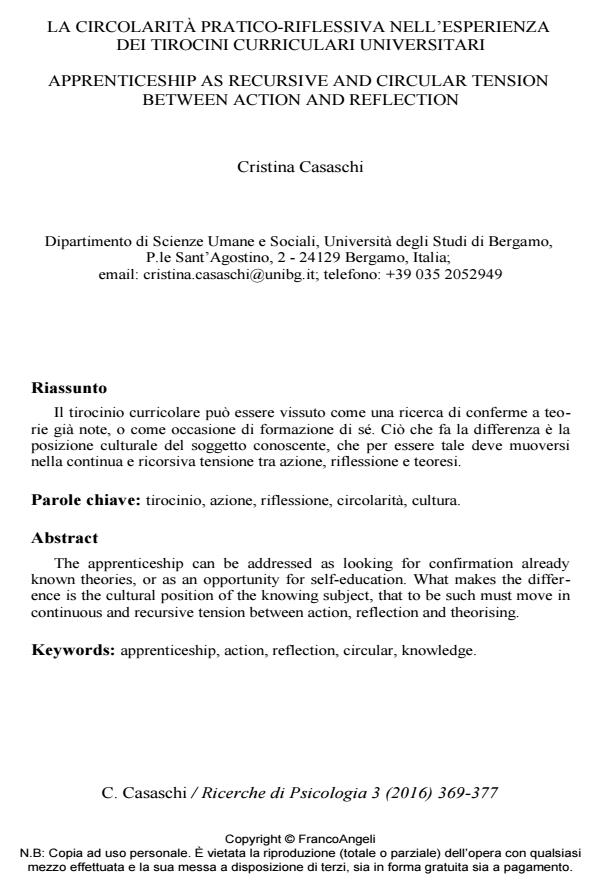Apprenticeship as recursive and circular tension between action and reflection
Journal title RICERCHE DI PSICOLOGIA
Author/s Cristina Casaschi
Publishing Year 2016 Issue 2016/3 Language Italian
Pages 9 P. 369-377 File size 169 KB
DOI 10.3280/RIP2016-003006
DOI is like a bar code for intellectual property: to have more infomation
click here
Below, you can see the article first page
If you want to buy this article in PDF format, you can do it, following the instructions to buy download credits

FrancoAngeli is member of Publishers International Linking Association, Inc (PILA), a not-for-profit association which run the CrossRef service enabling links to and from online scholarly content.
The apprenticeship can be addressed as looking for confirmation already known theories, or as an opportunity for self-education. What makes the difference is the cultural position of the knowing subject, that to be such must move in continuous and recursive tension between action, reflection and theorising.
Keywords: Apprenticeship, action, reflection, circular, knowledge
- Bateson, G. (1972). Verso un ’ecologia della mente. Trad. it., Milano: Adelphi, 1977.
- Bersanelli, M., & Gargantini, M. (2003). Solo lo stupore conosce. L’avventura della ricerca scientifica. Milano: BUR.
- Bertagna, G. (2010), Dall’educazione alla pedagogia. Avvio al lessico pedagogico e alla teoria dell’educazione. Brescia: La Scuola.
- Bertagna, G. (Ed.) (2012). Fare Laboratorio. Scenari culturali ed esperienze di ricerca nelle scuole del secondo ciclo. Brescia: La Scuola.
- Carrell, A. (1952). Riflessioni sulla condotta della vita. Trad. it., Siena: Cantagalli 2004.
- Cerioli, L. (Ed.) (2006). Tutorship nel nuovo sistema formativo. Milano: FrancoAngeli.
- Ceruti, M. (2014). La fine dell’onniscienza. Roma: Studium.
- Perret Clermont, A.N., Pontecorvo, C., Resnick, L.B., Zittoun, T., Burge, B. (2004). Joining society: Social interaction and learning in adolescence and youth. Cambridge, UK, New York: Cambridge University Press.
- Resnick, L.B. (1995). Imparare dentro e fuori la scuola. In C. Pontecorvo, A.M. Ajello, C. Zucchermaglio (Eds.), I contesti sociali dell’apprendimento, (pp. 61-81). Milano: LED.
- Rigotti, E. (2009). Conoscenza e significato. Per una didattica responsabile. Milano: Mondadori.
- Sennett, R. (2008). L’uomo artigiano. Trad. it., Milano: Feltrinelli, 2010.
- Shon, D.A. (1987). Formare il professionista riflessivo: per una nuova prospettiva della formazione e dell’apprendimento nelle professioni. Trad. it., Milano: FrancoAngeli, 2006.
- Teihlard de Chardin, P. (1955). Il fenomeno umano. Trad. it., Brescia: Queriniana, 2014.
- Vygotskij, L.S. (1934). Pensiero e linguaggio. Trad. it., Firenze: Giunti, 2007.
- Wenger, E. (1998). Comunita di pratica. Apprendimento, significato e identita. Trad. it., Milano: Raffaello Cortina, 2006
Cristina Casaschi, La circolarita pratico-riflessiva nell’esperienza dei tirocini curriculari universitari in "RICERCHE DI PSICOLOGIA " 3/2016, pp 369-377, DOI: 10.3280/RIP2016-003006